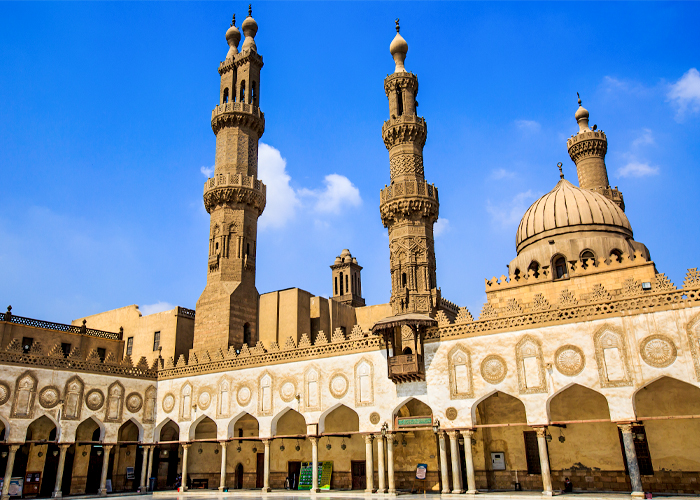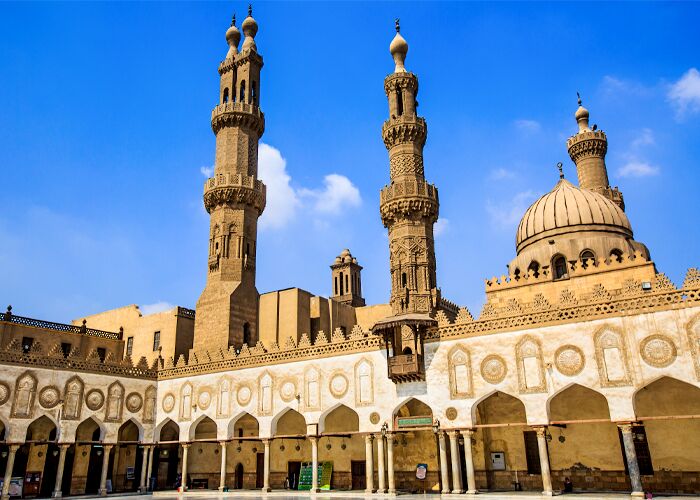Al-Azhar Mosque:
Introduction
Al-Azhar Mosque is one of the most influential and iconic landmarks in Cairo, drawing travelers, scholars, and worshippers for over a millennium. Revered as both a place of worship and a center of learning, it has become a symbol of Islamic heritage and intellectual tradition. For those searching about al azhar mosque cairo, al azhar mosque egypt, or planning al-azhar mosque tours, this site offers an experience that goes beyond architecture, immersing visitors in the living story of Cairo’s religious and cultural identity. The mosque of al azhar is more than a monument—it is a journey into faith, history, and scholarship.
The History of Al-Azhar Mosque
The history of al azhar mosque stretches back to the Fatimid dynasty in the 10th century. Construction began in 970 CE under the rule of the Caliph Al-Mu’izz li-Din Allah and was completed in 972 CE, making it one of the earliest Fatimid structures in the new city of Cairo. From the beginning, the azhar mosque was not just a place for prayer but also an institution of learning. The mosque became central to the Fatimids’ vision of Cairo as both a political capital and a religious beacon.
The al azhar mosque was completed in a time of great transformation. Cairo had just been founded as the Fatimid capital, and this mosque served as a cornerstone of their cultural and spiritual influence. Within its halls, the first lessons of what would eventually evolve into Al-Azhar University were delivered. Over the centuries, the mosque endured expansions, renovations, and contributions from rulers including the Mamluks and Ottomans, each leaving their mark on its legacy.
For travelers exploring azhar mosque cairo today, the sense of continuity is remarkable. The structure has withstood dynastic changes, invasions, and political shifts, yet it remains one of the most revered mosques in the Islamic world. A visit offers the opportunity to stand where countless scholars, leaders, and worshippers once gathered, connecting past and present through faith and knowledge.

Architectural Splendor and Design
The architecture of al-azhar mosque cairo is a captivating blend of styles that span centuries of Egyptian history. Its earliest design reflected Fatimid principles, with a simple prayer hall and courtyard. Over time, contributions from later dynasties transformed the mosque into an architectural masterpiece. Today, the al azhar mosque cairo egypt is admired for its combination of Fatimid, Mamluk, and Ottoman elements.
One of the defining features of masjid al azhar is its collection of five minarets, each built in a distinct style. These towers symbolize the mosque’s long history and architectural evolution. Inside, the marble-paved courtyard invites visitors to reflect, while the surrounding arcades lead to prayer halls adorned with decorative woodwork, stone carvings, and Quranic inscriptions. The mihrab, an ornate prayer niche, guides worshippers toward Mecca and exemplifies fine craftsmanship.
Travelers on al-azhar mosque tours are often struck by the harmony of the mosque’s design. The space embodies tranquility, with light streaming into the courtyard and illuminating the centuries-old details. Whether admiring the geometric patterns, carved ceilings, or expansive arches, visitors find that the al azhar masjid represents not only a house of prayer but also a visual narrative of Cairo’s artistic heritage.
For photographers, the mosque of al azhar offers endless opportunities. Capturing the contrast between ancient walls and the vibrant life of modern Cairo surrounding it, masjid azhar remains one of the most striking landmarks in Egypt. The al azhar cairo experience is as much about aesthetics as it is about spirituality.
Religious and Cultural Significance
Al-azhar mosque cairo is not only a place of worship but also a symbol of knowledge, faith, and cultural continuity. Since its foundation, it has played a dual role as both a religious sanctuary and a center of education. The mosque became the nucleus for Al-Azhar University, which today stands as one of the oldest and most respected Islamic institutions in the world.
The masjid al-azhar has hosted generations of scholars, shaping Islamic thought, law, and philosophy across the globe. Its influence extended far beyond Egypt, as students from Asia, Africa, and Europe traveled to study under its scholars. For worshippers, al azhar mosque in cairo egypt is a sacred place where daily prayers, Friday sermons, and special religious events bring the community together.
Culturally, the mosque is deeply intertwined with Egypt’s identity. It has stood as a witness to revolutions, reforms, and periods of transition, while consistently serving as a spiritual anchor for the people. The al azhar masjid continues to embody Egypt’s role as a bridge between civilizations, connecting history with modern life.
For travelers, exploring azhar mosque egypt offers more than sightseeing. It provides a window into the living traditions of Cairo, where faith and scholarship remain central. Standing inside the mosque, visitors feel part of a story that has endured for over a thousand years.
Al-Azhar Mosque in the Context of Cairo
The location of al-azhar mosque cairo makes it a vital part of the city’s historic and cultural core. Situated near the famous Khan el-Khalili bazaar, the mosque stands at the heart of Old Cairo’s vibrant landscape. Travelers visiting al azhar mosque cairo egypt can combine their experience with exploring bustling markets, traditional cafes, and nearby historic landmarks.
The mosque’s position also highlights its role in the daily life of the city. Surrounding streets hum with activity, yet inside the mosque, a sense of calm prevails. This contrast enhances the experience, offering visitors a peaceful retreat in the midst of Cairo’s energy. The azhar masjid is part of a larger story that includes neighboring mosques such as the Mosque of Sultan Hassan and Al-Hussein Mosque, forming a network of monumental sites within the city.
For travelers joining al-azhar mosque tours, the journey often includes guided walks through historic alleys and cultural hotspots. The mosque of al azhar serves as a starting point for understanding Cairo’s spiritual and social fabric. Exploring the neighborhood, visitors see firsthand how the mosque anchors the community and continues to shape daily life in the city.
By situating al azhar mosque in cairo egypt within its broader context, travelers gain a deeper appreciation for how faith, commerce, and culture intersect in one of the world’s oldest cities. The al azhar cairo experience thus becomes not just a visit to a mosque, but a step into Cairo’s enduring soul.
Visiting Al-Azhar Mosque Today
For modern travelers, visiting al azhar mosque egypt is an enriching experience that combines spirituality, history, and culture. The mosque remains an active place of worship, welcoming both worshippers and tourists with open doors. Visitors are encouraged to dress modestly and respect local customs, ensuring a meaningful and respectful experience.
Inside, the peaceful ambiance contrasts with the bustling streets outside. Many travelers find themselves captivated by the quiet beauty of the courtyard or the intricate details of the minarets and prayer halls. Guides on al-azhar mosque tours help bring the mosque’s history to life, sharing stories of its founding, architectural changes, and scholarly influence.
Photography is popular, with travelers often capturing the unique blend of ancient architecture and modern vitality. Whether in the early morning light or at sunset, the mosque’s atmosphere leaves a lasting impression. Masjid al azhar cairo remains not only a sacred space but also a cultural treasure that enriches every visit.
For travelers organizing trips through Cairo, including al azhar mosque cairo on an itinerary ensures a balanced exploration of Egypt’s heritage. Beyond pyramids and temples, the azhar mosque cairo offers an authentic connection to the country’s Islamic history and ongoing traditions. Experiencing masjid azhar firsthand allows travelers to engage with Cairo in a profound and memorable way.
Conclusion
The al azhar mosque is far more than a monument—it is a living testament to Egypt’s religious, cultural, and intellectual heritage. From its founding in the 10th century to its present-day role as a place of worship and learning, it has shaped both Cairo and the wider Islamic world. Visitors who step into the al-azhar mosque in cairo egypt discover a site where history, architecture, and faith converge, offering an unforgettable experience.
For travelers eager to explore Egypt beyond its ancient wonders, the al azhar mosque cairo egypt is an essential destination. Whether through architecture, scholarship, or spirituality, the mosque of al azhar continues to inspire, educate, and welcome all who enter. It stands as a reminder that Cairo’s story is not only about the past but also about the living traditions that endure through time.

